
Peloton, the maker of high-end exercise bikes and treadmills, is already having a pretty rough year in 2021.
Back in April, the U.S. Consumer Product Safety Commission (CPSC) warned consumers to ‘Stop Using the Peloton Tread+’ (in so many words, directly) with a disturbing video!
Peloton pushed back on the warning by calling the CPSC warning ‘inaccurate and misleading’.
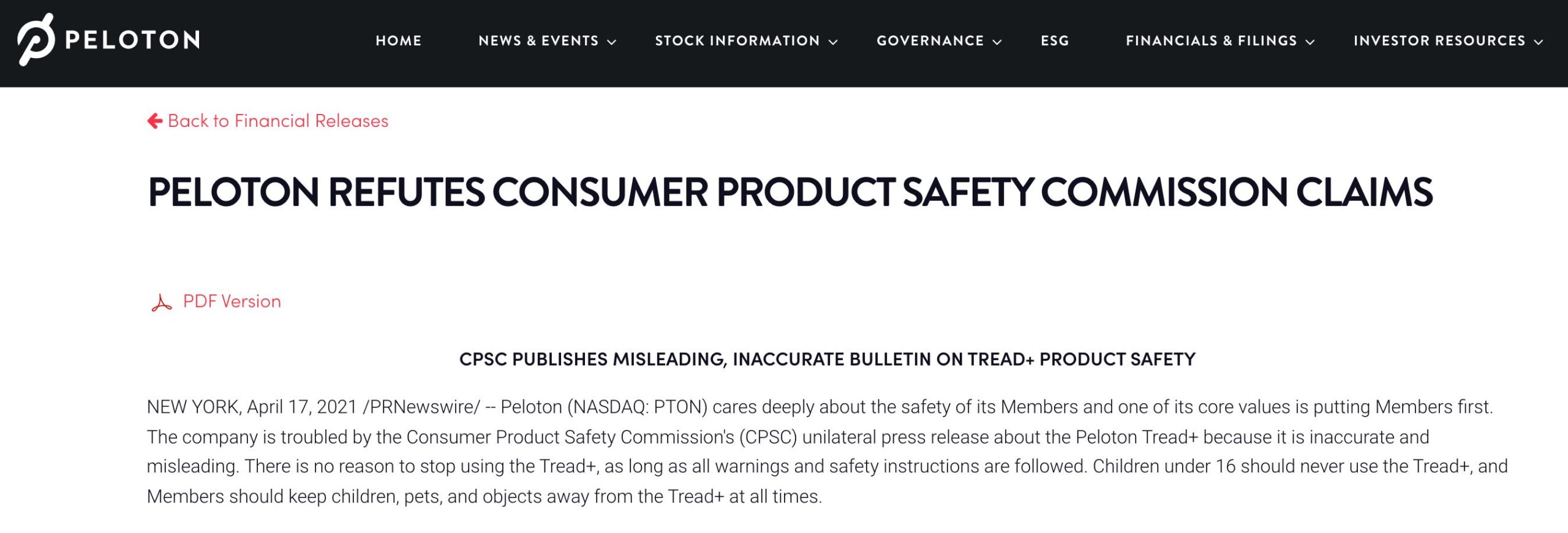
Then the brand dug in with, “You may also have read news reports suggesting that CPSC believes that we should stop selling or recall the Tread+. I want to assure you that we have no intention of doing so.”
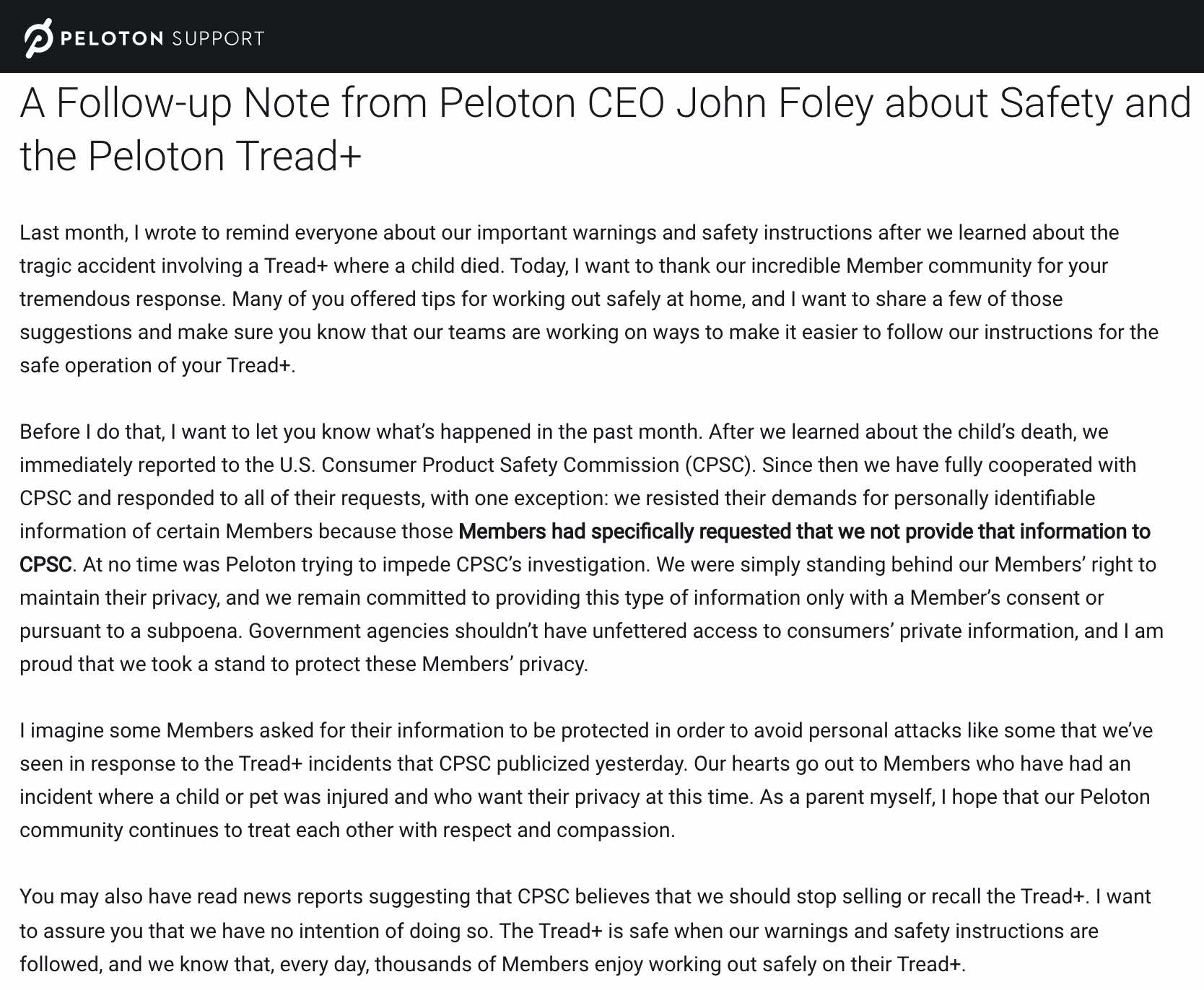
But in May, the brand issued a voluntary recall of its Tread and Tread+ treadmills owing to at least 72 reported incidents involving people and pets being pulled under the machines, and the death of a 6-year-old.

This was a PR disaster that the company had precipitated through its own actions.
But in the second week of December, Peloton was to face a far bigger reputation crisis!
The Sex and the City reboot, titled ‘And Just Like That’ premiered on December 9, 2021. The first episode had (spoiler alert) a scene where the character Jon James Preston aka Mr. Big (played by Chris Noth) is seen riding a Peloton bike (introduced by name, by Peloton trainer Jess King), having a heart attack just after his session and then dying, in the episode… just like that!

It seems Peloton knew that its bike would be used in the show’s premiere and also that Jess King, a Peloton trainer, would be featured as Allegra (a trainer, within the show). But HBO cited confidentiality clauses to not tell Peloton the context in which their product would be used.
This is one of the many reasons why a much larger brand like Apple insists through a clause that Hollywood directors cannot show bad on-screen characters using Apple products!
But Peloton is no Apple. And they had no idea that a massively popular HBO show is going to use their product as a (on-screen character’s) murder weapon where the product is shown and used by name very specifically!
So far, this is a classic PR crisis where the company’s share price plunged too as a result of the fictional portrayal.

The last time a brand got into a crisis because a highly popular TV show showed the brand in terribly poor light was Crock-Pot’s portrayal in the 13th episode in the second season of This Is Us, in 2018. That scene too had an on-screen character suffering a fatal cardiac arrest, but unlike And Just Like That, that cardiac arrest came after the Crock-Pot cooker ended up burning the entire house down!
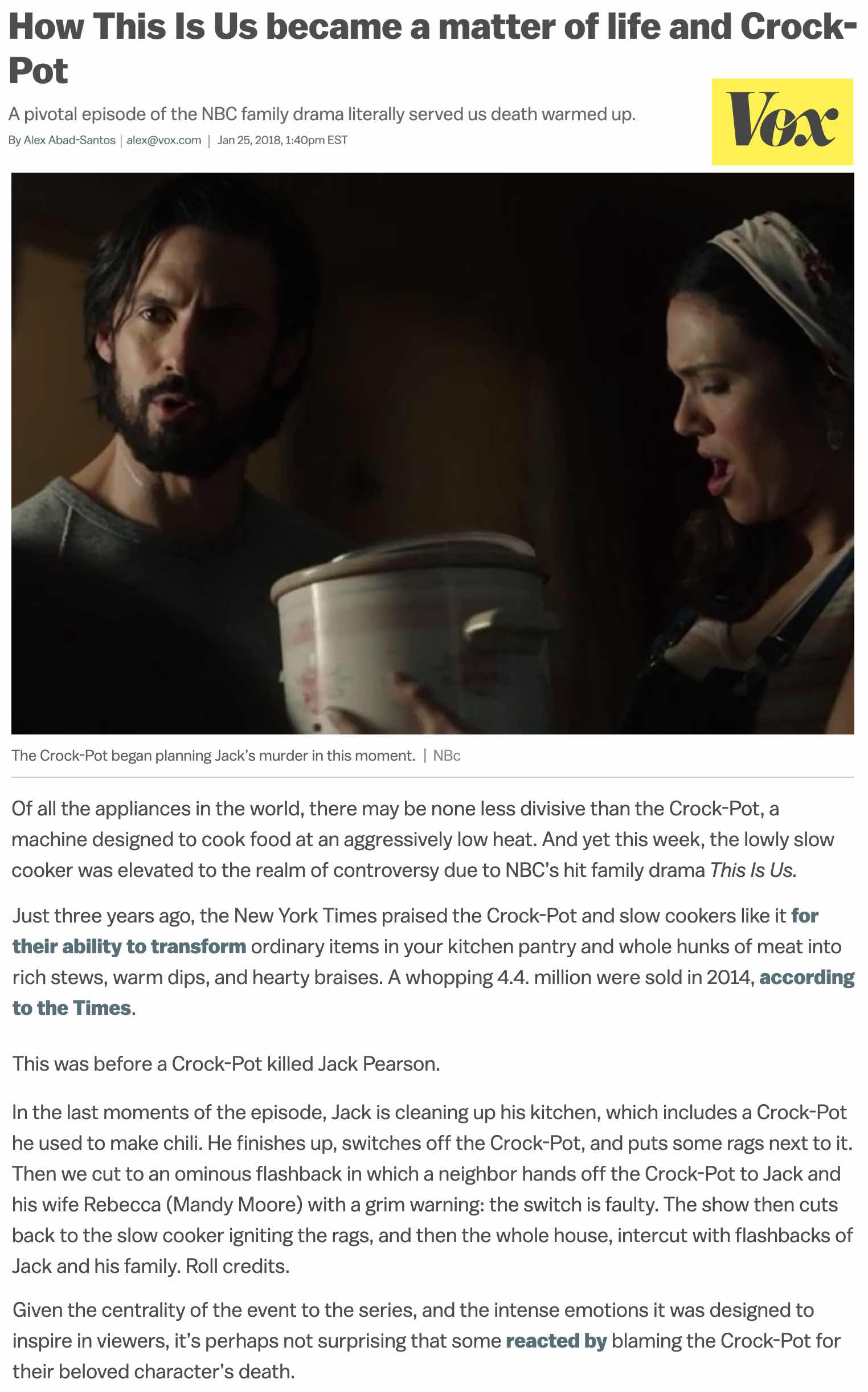
How did Crock-Pot react back then?
1. Crock-Pot didn’t even have a Twitter account at that time, but it went on to do everything by the PR crisis book – it set up a Twitter account called ‘CrockPotCares’ and started replying to people who were asking questions about Crock-Pots being a fire hazard in the kitchen.
2. It got credible third-party influencers to talk on its behalf. This included the show’s creator Dan Fogleman and the star who died on the show, Milo Ventimiglia himself!
3. The brand responded with facts and science, as any PR professional would recommend during a crisis like this that takes on a strong emotional hue.
The broad idea within a PR response to such a crisis is to not direct people towards the scene of the fire, so to say – that is, the incriminating scene that caused the crisis in the first place. But the point is to add to the conversation so that people who have already seen/heard about the scene get to know the brand’s point of view also.
What does Peloton do?
It did what standard PR response templates offer. It got a trusted and credible voice to respond to the show’s use of the bike with facts and science – Dr. Suzanne Steinbaum, cardiologist and member of Peloton’s Health & Wellness Advisory Council. She said, “I’m sure Sex and the City fans, like me, are saddened by the news that Mr. Big dies of a heart attack. Mr. Big lived what many would call an extravagant lifestyle — including cocktails, cigars, and big steaks — and was at serious risk as he had a previous cardiac event in Season 6. These lifestyle choices and perhaps even his family history, which often is a significant factor, were the likely cause of his death. Riding his Peloton bike may have even helped delay his cardiac event.”
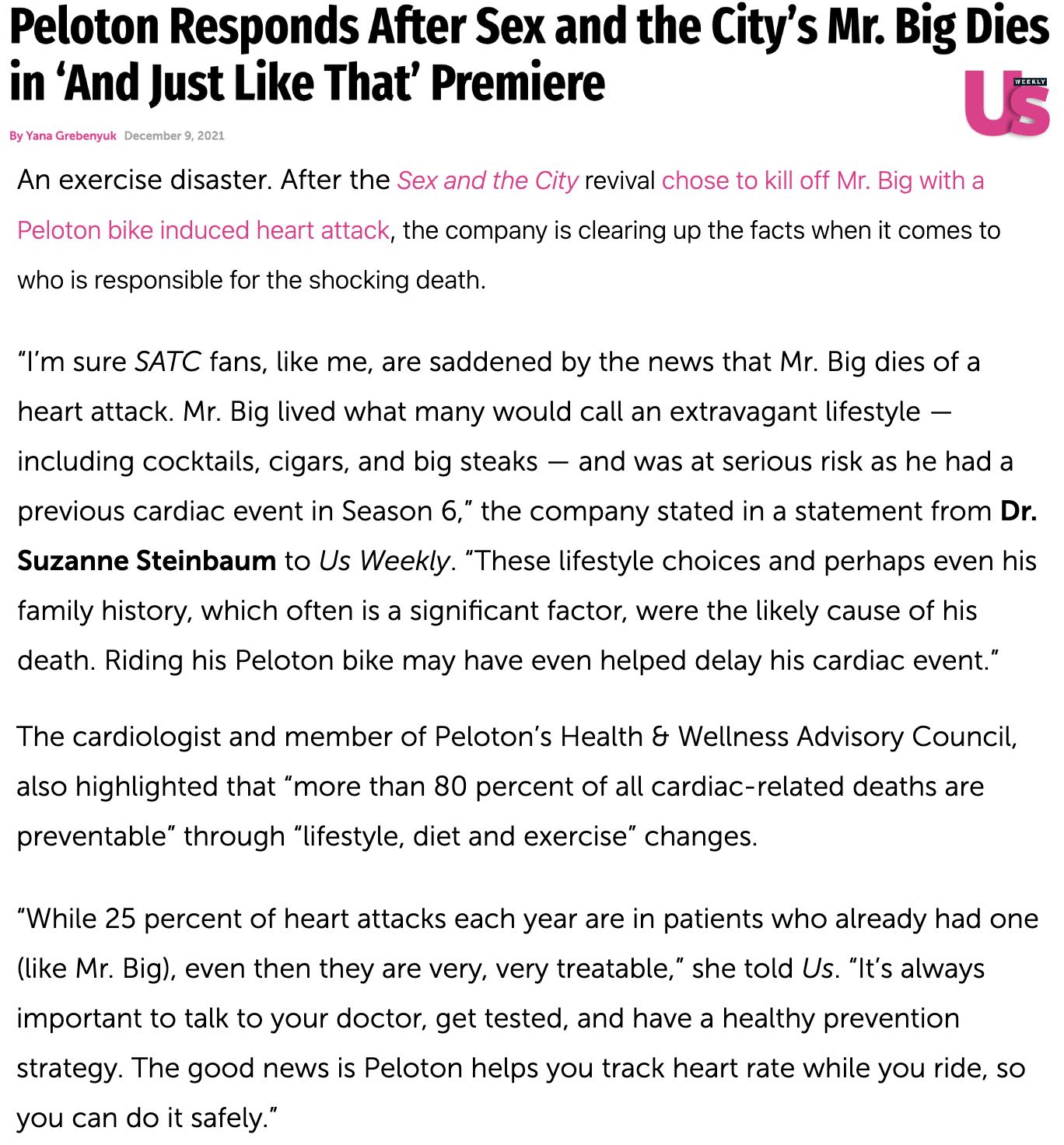
So far, on point, and very well handled.
But a response (even if by a credible person) is simply that. It plays against a far more discussed/viewed form of entertainment, with a show that has iconic popularity over many years. The chances of the people who have seen the premiere also reading the cardiologists’ logical response is slim.
So, what did Peloton do next?
It did something that was completely outside the purview of standard PR tactics. It inserted itself into the show’s context with a cheeky ad that both mocks and pivots the show’s plot involving the brand!
Peloton roped in Maximum Effort, Ryan Reynold’s ad agency, to produce a follow-up to the show’s scene involving the bike, in just 48 hours! (Observe the number of views on Twitter alone!)
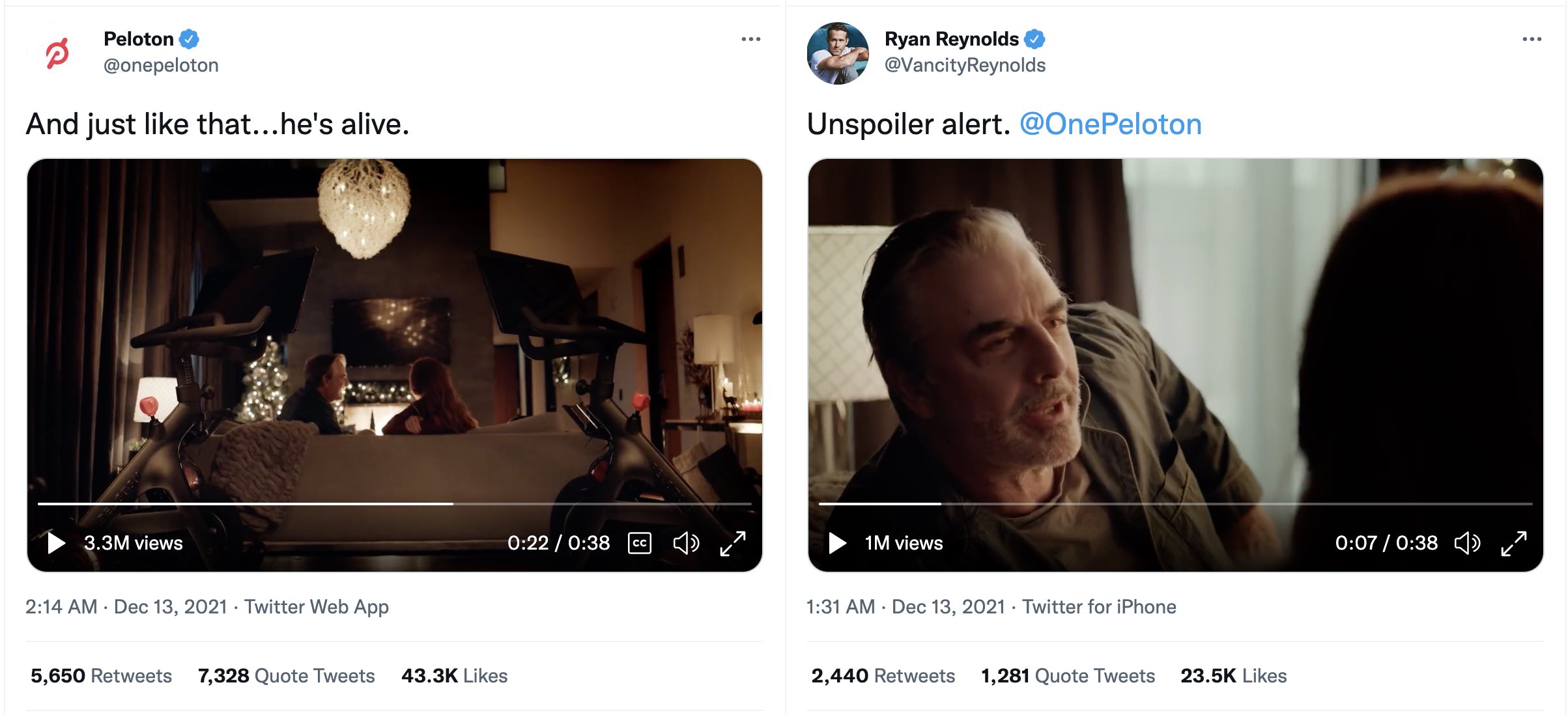
But just because it was produced in 48 hours, it is not a slapdash job. It’s sparkling with humor and makes viewers smirk at how clever it extends the show’s use of the product while also explaining the product’s response.
Here’s Peloton’s Chief Marketing & Communications Officer, Dara Treseder (48 hours for her, from the start), and the ad’s director Vincent Peone (24 hours for him, after Peloton contacted him subsequent to their plan) confirming the speed at which it was put together.
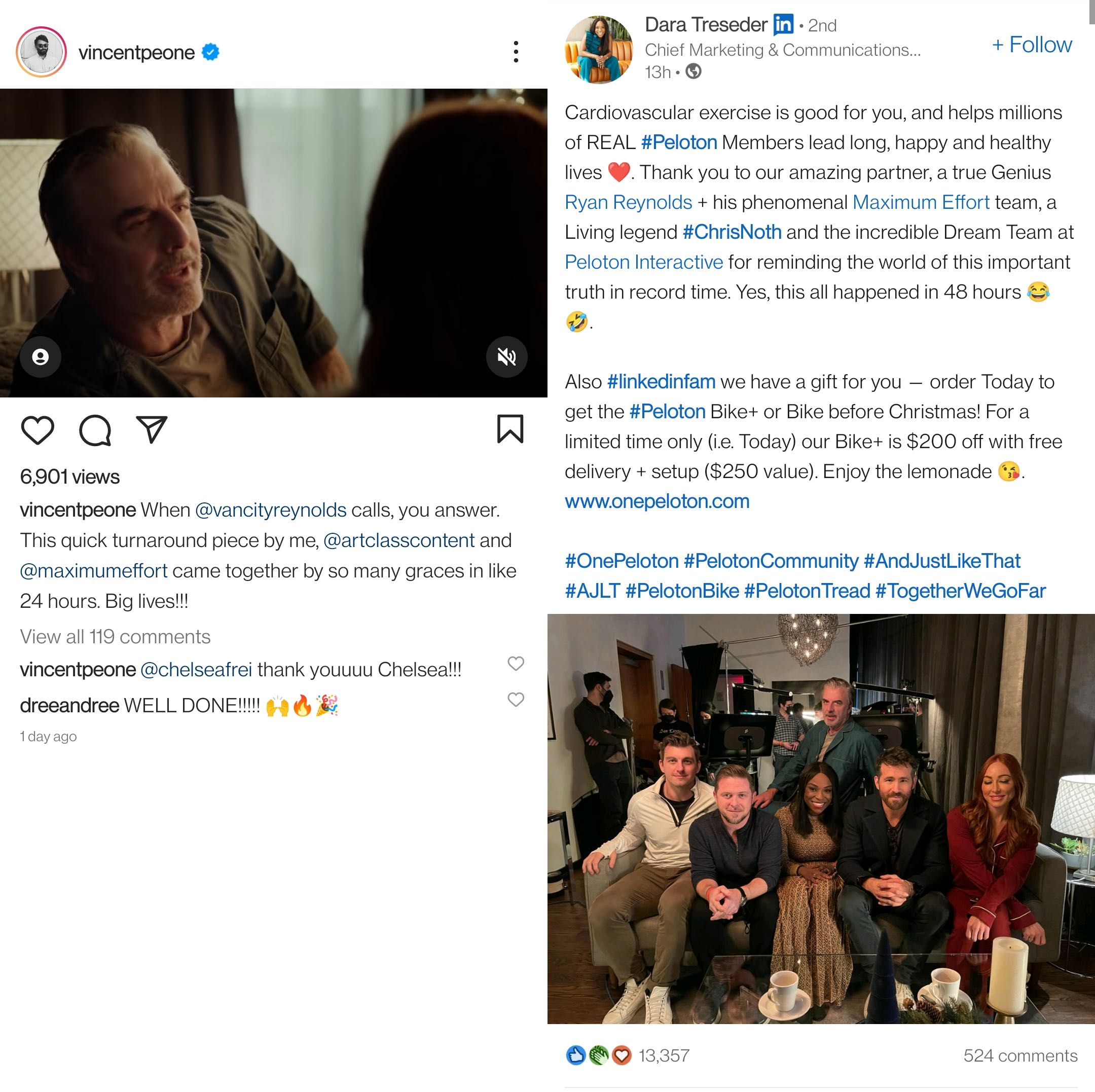
The irony here is that in December 2019, when a Peloton Christmas ad went viral for all the wrong reasons (people alleged that the husband in the ad was pressuring his wife to stay fit), Ryan Reynolds tracked down the actor who plays the wife and made an ad for his own Gin brand Aviation that starts where the Peloton ad left off!
Peloton uses the same chutzpah that Ryan had demonstrated against the brand two years ago in a clever move to make it work for the brand.
The standard reaction in PR circles, to a crisis like this, would have been to avoid inflicting more damage to the brand. Usually, the brand team desperately wishes that the crisis would pass through and people would move on from the show’s depiction of the product. And all the PR responses would be geared in a way to move people away from the incriminating scene and only react to those who have seen it already.
But this crisis needed more… it needed an X factor given what the brand was up against in terms of viral discussion. The best way to make people also talk about the brand’s response was never going to happen through what the cardiologist says. It would happen only when the brand offers a response that can rival the show’s popularity. And that means the brand has to actually go back to the seat of the fire and jump into it confidently 🙂
In a way, Peloton’s response would have a lot more people being curious about the show’s portrayal of the product even if they have not heard about the show or are not interested in it at all. I’m the perfect example for this – I caught up with the premiere episode only after seeing Peloton’s response and tons of others have commented online too on these lines – that they forced themselves to catch the show only to understand why Peloton responded this way!
That’s a very bold move and outside established crisis PR templates. And the way Peloton reacted also blurs the lines between PR and advertising. Peloton’s new ad film is precisely that – an advertising film dropped digitally. But it did not start with the objective of selling Peloton. It started with the intention of responding to a PR crisis/a crisis of brand reputation. If not for the crisis emanating from the show, the brand wouldn’t have considered roping in Chris Noth and Jess King for an ad film! They are in Peloton’s ad only because of a PR crisis!
Who better than Ryan Reynolds for such an audacious act, considering he is not just an ad agency owner but is also a media partner and influencer rolled into one who can take the client’s message to 70+ million people instantly? This is something no other conventional agency, PR or advertising, can offer!
